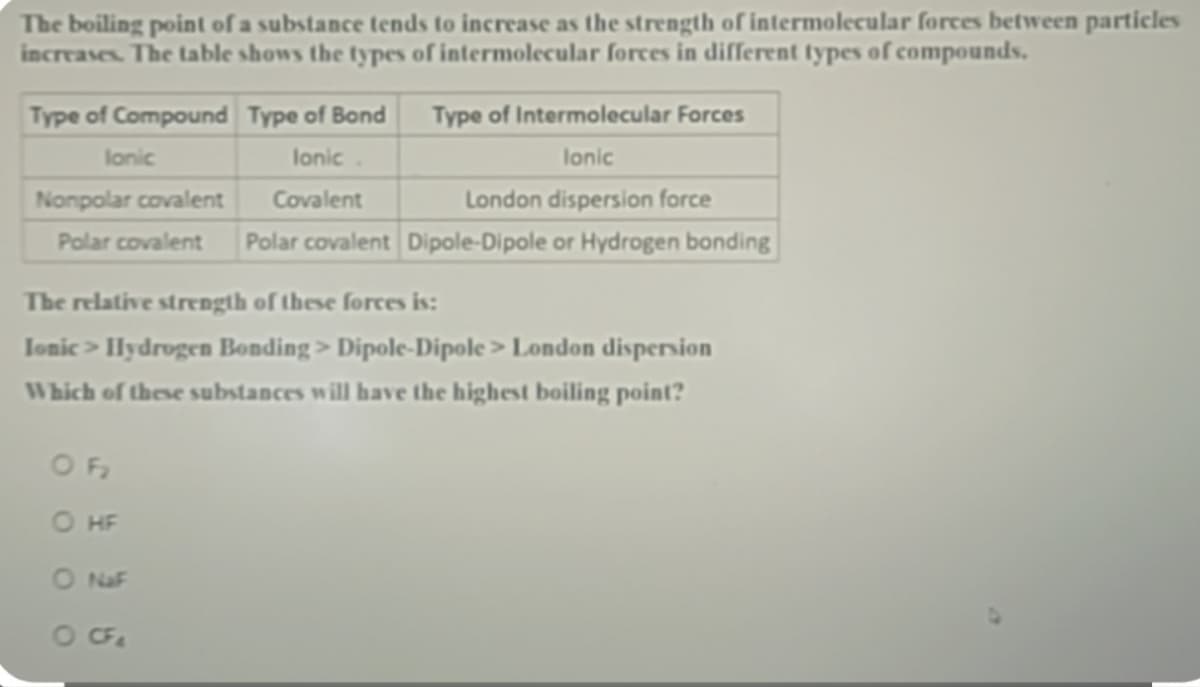The boiling point of a substance tends to increase as the strength of intermolecular forces between particles increases. The table shows the types of intermolecular forces in different types of compounds. Type of Compound lonic Type of Bond lonic. Covalent Type of Intermolecular Forces Ionic London dispersion force Nonpolar covalent Polar covalent Polar covalent Dipole-Dipole or Hydrogen bonding OF₂ O HF O NaF O CF₂ The relative strength of these forces is: Ionic > Hydrogen Bonding > Dipole-Dipole> London dispersion Which of these substances will have the highest boiling point?
The boiling point of a substance tends to increase as the strength of intermolecular forces between particles increases. The table shows the types of intermolecular forces in different types of compounds. Type of Compound lonic Type of Bond lonic. Covalent Type of Intermolecular Forces Ionic London dispersion force Nonpolar covalent Polar covalent Polar covalent Dipole-Dipole or Hydrogen bonding OF₂ O HF O NaF O CF₂ The relative strength of these forces is: Ionic > Hydrogen Bonding > Dipole-Dipole> London dispersion Which of these substances will have the highest boiling point?
Chemistry & Chemical Reactivity
9th Edition
ISBN:9781133949640
Author:John C. Kotz, Paul M. Treichel, John Townsend, David Treichel
Publisher:John C. Kotz, Paul M. Treichel, John Townsend, David Treichel
Chapter11: Intermolecular Forces And Liquids
Section: Chapter Questions
Problem 51SCQ
Related questions
Question
100%
The boiling point of a substance tends to increase as the strength of intermolecular forces between particles increases. The table shows the types of intermolecular forces in different types of compounds.
Type of Compound
Type of Bond
Type of Intermolecular Forces
lonic
lonic
Nonpolar covalent
Covalent
London dispersion force
Polar covalent
Polar covalent
Dipole-Dipole or Hydrogen bonding
The relative strength of these forces is:
Ionic > Hydrogen Bonding Dipole-Dipole London dispersion
Which of these substances will have the highest boiling point?
F2
HF
NaF
CF4

Transcribed Image Text:The boiling point of a substance tends to increase as the strength of intermolecular forces between particles
increases. The table shows the types of intermolecular forces in different types of compounds.
Type of Compound
lonic
Type of Bond
lonic.
Covalent
Type of Intermolecular Forces
Ionic
London dispersion force
Nonpolar covalent
Polar covalent Polar covalent Dipole-Dipole or Hydrogen bonding
OF₂
O HF
O NaF
O CF₂
The relative strength of these forces is:
Ionic > Hydrogen Bonding > Dipole-Dipole > London dispersion
Which of these substances will have the highest boiling point?
Expert Solution
This question has been solved!
Explore an expertly crafted, step-by-step solution for a thorough understanding of key concepts.
This is a popular solution!
Trending now
This is a popular solution!
Step by step
Solved in 3 steps with 1 images

Knowledge Booster
Learn more about
Need a deep-dive on the concept behind this application? Look no further. Learn more about this topic, chemistry and related others by exploring similar questions and additional content below.Recommended textbooks for you

Chemistry & Chemical Reactivity
Chemistry
ISBN:
9781133949640
Author:
John C. Kotz, Paul M. Treichel, John Townsend, David Treichel
Publisher:
Cengage Learning

Chemistry & Chemical Reactivity
Chemistry
ISBN:
9781337399074
Author:
John C. Kotz, Paul M. Treichel, John Townsend, David Treichel
Publisher:
Cengage Learning

Introductory Chemistry: A Foundation
Chemistry
ISBN:
9781337399425
Author:
Steven S. Zumdahl, Donald J. DeCoste
Publisher:
Cengage Learning

Chemistry & Chemical Reactivity
Chemistry
ISBN:
9781133949640
Author:
John C. Kotz, Paul M. Treichel, John Townsend, David Treichel
Publisher:
Cengage Learning

Chemistry & Chemical Reactivity
Chemistry
ISBN:
9781337399074
Author:
John C. Kotz, Paul M. Treichel, John Townsend, David Treichel
Publisher:
Cengage Learning

Introductory Chemistry: A Foundation
Chemistry
ISBN:
9781337399425
Author:
Steven S. Zumdahl, Donald J. DeCoste
Publisher:
Cengage Learning

Organic Chemistry: A Guided Inquiry
Chemistry
ISBN:
9780618974122
Author:
Andrei Straumanis
Publisher:
Cengage Learning

Chemistry: Principles and Practice
Chemistry
ISBN:
9780534420123
Author:
Daniel L. Reger, Scott R. Goode, David W. Ball, Edward Mercer
Publisher:
Cengage Learning

Chemistry: Principles and Reactions
Chemistry
ISBN:
9781305079373
Author:
William L. Masterton, Cecile N. Hurley
Publisher:
Cengage Learning